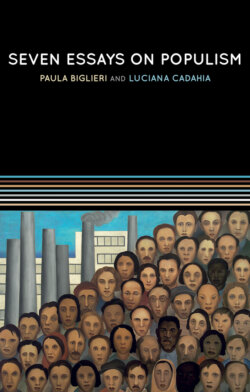Seven Essays on Populism

Реклама. ООО «ЛитРес», ИНН: 7719571260.
Оглавление
Paula Biglieri. Seven Essays on Populism
Table of Contents
Guide
Pages
Series Title. Critical South
Seven Essays on Populism. For a Renewed Theoretical Perspective
Copyright Page
Epigraph
Foreword Wendy Brown
Notes
Introduction
Notes
Essay 1 The Secret of Populism. The returns of populism
Modernization, class struggle, and the constitutive dimension of the political
Populism as ontology of the political
Notes
Essay 2 Neither Left nor Right: Populism without Apology. Populism, left and right?
Is all populism right-wing?
Just populism
Populism without apology
Notes
Essay 3 Against Neoliberal Fascism: From Sacrificial Identity to Egalitarian Singularity. Is populism a form of neoliberalism?
The prejudices of the liberal, anti-communist left
Autonomism: the opium of the people
Populism as transitional object?
Populism: antithesis of neoliberalism
Notes
Essay 4 Profaning the Public: The Plebeian Dimension of Republican Populism. Is populism anti-institutionalist?
Ruptural institutionality
Plebeian republicanism
Toward a republican populism?
Notes
Essay 5 Toward an Internationalist Populism. The beautiful souls of pure causes
The people and its leader
Toward an internationalist populism
Notes
Essay 6 The Absent Cause of Populist Militancy. Post-foundationalism and the absence of guarantees
Neither the cemetery nor the madhouse
The three militant questions
Notes
Essay 7 We Populists are Feminists. Let’s imagine the future
Feminism without identitarian closure
Populist feminism (or the antagonism of care)
Feminist populism (or the homeland is the other)
Notes
Bibliography
Index
POLITY END USER LICENSE AGREEMENT
Отрывок из книги
The publication of this series is supported by the International Consortium of Critical Theory Programs funded by the Andrew W. Mellon Foundation.
Series editors: Natalia Brizuela and Leticia Sabsay
.....
For Laclau, then, far from being a fallen form of politics, “populism is the royal road to understanding something about the ontological constitution of the political as such” (2005a: 67). We might also put this the other way around. Through the lens of populism, we can see just how profoundly anti-political much of Western political life and political theory has been. From Platonism and Marxism through liberalism and neoliberalism, most theory and practice aims at taming, reducing or disavowing the qualities of the political overtly expressed in populism – antagonism, rhetoric, constituted identity, indeterminacy and, above all, the power of the people. Most political theory and practice in the Western tradition has aimed at extinguishing these elements and instead identified “management of community [as] the concern of an administrative power whose source of legitimacy is a proper knowledge of what a ‘good’ community is” (2005a: x). Exceptions to this anti-political orientation are few and rare. There is Machiavelli, with his subtle appreciation of political drama, effect and affect, of invented formations and alliances, and his recognition that the health of republics, far from being endangered by popular “tumults,” is secured by them. There is Tocqueville, writing in the democratic (as opposed to oligarchic) republican tradition, who grasped the value for democracy – along with the messiness – of cultivating an energized people ambitious to share political power for purposes beyond pursuit of individual or class interests. And there is Gramsci, that ardent student of Machiavelli and not only Marx, who theorized the importance of actively linking popular struggles to articulate a new hegemonic bloc. Today, there are also left Schmittians, Deleuzians, and radical democrats, but they hold a tellingly small place in contemporary political theory, where liberal approaches reiterate the long tradition of attempting to expunge from politics contingency, fabrication, rhetoric, antagonism, agonism, and the popular – all that constitutes the political from a populist perspective.
Biglieri and Cadahia broadly endorse Laclau’s identification of populism with the ontology of the political. They focus especially on the aspect of this identification that features the transformation of different social antagonisms into allied political ones. As a politics that is explicitly made not born, a politics that does not express these social antagonisms directly and individually but, rather, actively (militantly) crafts them into a hegemonic formation opposing powerlessness to power, populism invents a new dividing line and the identities on both sides of it: “the underdog” versus the “power” in Laclau’s words, “the people versus the enemies of the people” in those of Biglieri and Cadahia (16). Here, they pursue Laclau’s alertness to populism’s unique alchemical capacity to transform segmented, siloed, or what he called differential demands into an equivalential relation with one another. This is the transformation that de-individuates these demands, developing instead a political frontier between the people and the power, a frontier that in turn opens new political possibilities and imaginaries. This is the alchemy that permits a critical perspective on and challenge to the discourse, organization, and arrangements, not merely the distributions, of the status quo. This is an alchemy that explodes the limits of the interest group pluralism of liberalism and the class politics of Marxism while remaining legible to and in present discourses. Therein lies populism’s deep immediate radical potential.
.....